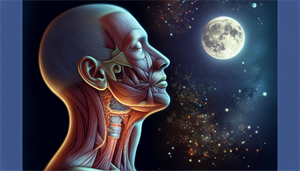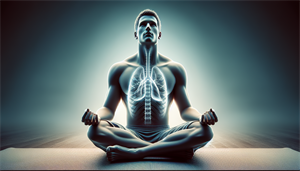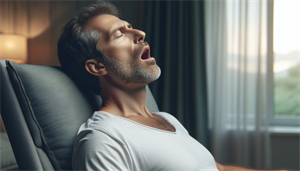Eager to learn how to cure sleep apnea naturally? This article cuts right to the chase, offering concrete, natural methods that may help you eliminate sleep apnea symptoms once and for all. From optimizing your lifestyle to practicing specific breathing techniques, prepare to take actionable steps towards restful, uninterrupted sleep, minus the medical gadgets.
Key Takeaways
-
Lifestyle changes such as maintaining a healthy weight, practicing good sleep hygiene, and avoiding alcohol and tobacco are critical for controlling sleep apnea symptoms.
-
Engaging in throat and breathing exercises, such as singing vowels, performing throat muscle workouts, and practicing yoga breathing techniques, can strengthen respiratory muscles and improve sleep apnea.
-
For more severe sleep apnea cases, medical interventions such as CPAP therapy or surgery are essential, and alternative treatments like positional therapy, herbal remedies, and oral appliances should be considered with professional advice.
Understanding Sleep Apnea and Its Natural Solutions

Sleep apnea chiefly manifests in two primary classifications; obstructive sleep apnea (OSA) and central sleep apnea (CSA). OSA, also known as obstructive sleep apnea syndrome, arises from involuntary muscle relaxation that obstructs the airways, whereas CSA stems from inadequate signaling from the brain to the breathing control muscles. The typical factors contributing to sleep apnea span the dimensions of the throat or jaw, weight, age, and gender. Symptoms commonly include pronounced snoring, disturbed sleep, and daytime drowsiness.
Continual loud snoring, excessive daytime sleepiness, morning headaches, or observed pauses in breathing during sleep should prompt a medical consultation. These symptoms could signal sleep apnea, warranting medical guidance before trying any home remedies.
Despite the need for medical consultation, natural solutions can aid in managing sleep apnea symptoms within a home environment. Lifestyle modifications, changes in sleep position, and weight loss can lead to significant improvements. Nonetheless, if the symptoms persist despite these remedies, it becomes necessary to seek medical intervention.
The Role of Lifestyle in Treating Sleep Apnea Naturally

Lifestyle changes are pivotal in controlling sleep apnea symptoms. From maintaining a healthy weight to practicing good sleep hygiene and avoiding harmful substances, simple changes in your day-to-day routine can offer significant relief.
Embracing a Healthy Weight
Attaining and maintaining a healthy weight can significantly reduce the risk of sleep apnea and alleviate its symptoms. Weight management assists in alleviating this condition and suppressing sleep apnea symptoms by reducing airway pressure.
There is a robust correlation between obesity and sleep apnea. Excess body weight, particularly fat accumulation in the upper respiratory tract, can lead to airway constriction. This constriction triggers airway collapse during sleep, thereby causing sleep apnea. Obesity significantly raises the likelihood of developing sleep apnea and makes it more challenging to treat.
Prioritizing Sleep Hygiene
Adopting good sleep hygiene is crucial for the control of sleep apnea. It aids in establishing a healthy sleep pattern and optimizing the sleep environment, thereby improving sleep quality and reducing sleep apnea symptoms.
A comfortable sleep environment involves ensuring the room is dark, quiet, and at a comfortable temperature. A consistent sleep schedule preserves the body’s internal clock and facilitates deeper, more rejuvenating sleep. Additionally, it aids in aligning hormonal and metabolic regulations, which may otherwise be disrupted in individuals with sleep apnea.
Avoiding Harmful Substances
Certain substances can exacerbate sleep apnea symptoms. Excessive alcohol consumption can relax the muscles in the throat, causing disruption to regular breathing patterns. This can result in heightened snoring and a disrupted sleep cycle, ultimately aggravating sleep apnea symptoms.
Smoking induces inflammation and swelling of the upper airways, thereby exacerbating sleep apnea through the facilitation of blockages and snoring. Hence, abstaining from alcohol, smoking, and the use of sedatives is advisable to avoid aggravating sleep apnea symptoms.
Breathing Techniques and Exercises for Sleep Apnea Patients

Apart from lifestyle changes, specific breathing techniques and exercises can aid in controlling sleep apnea symptoms. These exercises aim to strengthen the muscles associated with breathing, thereby improving respiratory function.
Throat Muscle Strengthening
Throat exercises or oropharyngeal exercises can mitigate the severity of sleep apnea symptoms by fortifying the throat muscles and reducing obstructions in the airway.
Specific exercises that can strengthen the throat muscles and enhance sleep apnea symptoms include:
-
Singing or pronouncing vowel sounds slowly
-
Performing the lion roar exercise
-
Blowing through a straw
-
Doing tongue exercises
-
Practicing throat exercises
By incorporating these exercises into your routine, you can reduce sleep apnea symptoms and improve your overall sleep quality.
Breath Control Practices
Breath control practices like yoga and meditation can also assist in managing sleep apnea. With their focus on deep, controlled breathing and relaxation, these practices can greatly improve respiratory function and sleep quality.
Specific breath control techniques used in yoga for managing sleep apnea include Dog breathing, Rabbit breathing, and Lion breathing. These techniques aim at strengthening the upper airway muscles and enhancing breathing during sleep.
The Power of Positional Therapy in Sleep Disorder Management

Positional therapy, another non-invasive approach to managing sleep apnea, entails the utilization of specific body positions, such as side-sleeping and elevating the head. Such positions help mitigate airway obstruction while sleeping, thereby easing sleep apnea symptoms.
The side-sleeping position is often recommended for individuals with sleep apnea, as it can prevent the tongue from sliding back and obstructing the airway. For individuals who struggle with maintaining this position, a side-sleeping backpack could be a handy tool.
Herbal Remedies and Essential Oils for Relaxation

Herbal remedies and essential oils also offer potential benefits for individuals with sleep apnea. Lavender and valerian root, for instance, are known to induce relaxation and enhance the quality of sleep.
Lavender essential oil promotes relaxation and reduces anxiety, leading to improved sleep quality with its mild sedative effects. On the other hand, valerian root is known for promoting restful sleep, reducing stress and anxiety, and improving symptoms associated with tension-type headaches.
Alternative Treatment Options: Acupuncture and Oral Appliances
In addition to lifestyle changes and natural remedies for sleep apnea, there are alternative treatments that can provide additional support in managing sleep apnea symptoms. These encompass acupuncture and oral appliances, although it’s vital to confer with a healthcare professional before their application. To treat sleep apnea naturally, consider these options along with the guidance of a medical expert.
Oral appliances for sleep apnea aim to stabilize the tongue or jaw in a specific position while being worn in the mouth. By moving the jaw forward, these devices help prevent airway obstruction during sleep, thereby potentially reducing snoring and alleviating mild sleep apnea symptoms.
Seeking Medical Treatment for Severe Sleep Apnea
Intense sleep apnea, particularly severe obstructive sleep apnea, may necessitate sleep apnea treatment to treat sleep apnea effectively. Sleep medicine, such as continuous positive airway pressure (CPAP) therapy or surgery, can provide effective relief and should be considered under the guidance of a healthcare professional.
CPAP therapy stands as the most common and effective medical treatment for sleep apnea. A CPAP machine administers pressurized air through a mask and tubing, maintaining the openness of the airway during sleep and averting its collapse, thereby facilitating normal breathing.
For severe cases of sleep apnea that do not respond to other treatments, surgical procedures like:
-
palate surgery
-
tongue-reduction procedures
-
uvulopalatopharyngoplasty (UPPP)
-
tracheostomy (in rare instances)
may be considered.
Summary
By taking the reigns on your sleep health, you have the power to improve your quality of life and overall health. Whether it’s through lifestyle changes, natural remedies, breathing exercises, positional therapy, or even medical treatments for severe cases - various options are available to manage and treat sleep apnea.
Remember, early intervention and a proactive approach can make a significant difference in managing sleep apnea. Start today, consult a healthcare professional, and take the first step towards better sleep and a healthier you.
Frequently Asked Questions
Can sleep apnea be cured naturally?
Unfortunately, sleep apnea cannot be cured naturally, but lifestyle changes such as weight loss, physical activity, and quitting smoking and drinking can help improve mild cases. However, CPAP therapy is still the gold standard for treatment.
What vitamin deficiency causes sleep apnea?
A lack of vitamin D may affect the severity of sleep apnea and lower D levels are linked to more severe cases of OSA in recent studies.
What herb is good for sleep apnea?
Chamomile and valerian are both herbs that have been shown to improve sleep quality and may help with sleep apnea. Consider incorporating them into your bedtime routine for potential benefits.
What are the main types of sleep apnea?
The main types of sleep apnea are obstructive sleep apnea (OSA) and central sleep apnea (CSA). These are the most common forms of the condition.
How can I manage my sleep apnea at home?
You can manage sleep apnea at home by making lifestyle changes such as maintaining a healthy weight, practicing good sleep hygiene, and avoiding harmful substances. This can help improve your condition and overall well-being.


